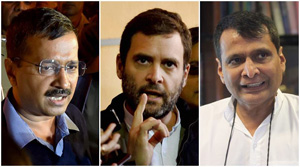New Delhi, Dec 14: Railway Minister Suresh Prabhu, Delhi Chief Minister Arvind Kejriwal and Congress leader Rahul Gandhi were locked in a war of words on Monday over the razing of hutments here and the death of a child of one of the hundreds left homeless in the winter chill.
The grieving father of the six-month-old baby insisted that the girl died in the panic caused by the imminent demolition of hutments at Shakur Basti in west Delhi on Saturday where they lived. The autopsy report said the death occurred due to head and chest injuries besides shock.
Prabhu told the Lok Sabha this was untrue and that the child died before the railways started pulling down the hutments they said were built illegally on railway land to make way for new rail lines.
Since the demolition, the hutment dwellers are living in the open, at the site, under canvas tents. Delhi's ruling Aam Aadmi Party (AAP) said it was determined to provide food and shelter to the poor.
On Monday, accompanied by Delhi Congress president Ajay Maken, Rahul Gandhi met the displaced men, women and children and vowed to fight for their rights.
Gandhi said: "We will try to help you... We will fight for you... We will raise the issue in parliament."
Gandhi's office tweeted that both the central and Delhi governments were to blame for the Saturday demolition. "Now they are busy blaming each other.
"Instead, they should provide help to the people who have been displaced and rehabilitate them."
Kejriwal promptly hit back, saying Gandhi was a "kid" who did not know that the railways which carried out the razing was controlled by the central, not Delhi, government.
Prabhu promised to invite Kejriwal to discuss how people left homeless due to the demolition could be rehabilitated and how public land could be put to use.
He said the demolition was carried out after sending repeated notices to people at Shakur Basti to vacate the land.
Calling the hutments an encroachment, Prabhu said they had become an impediment for building a new passenger terminal and were also a safety hazard.
In the Lok Sabha, AAP's Bhagwant Mann said the razing was an "atrocity on the poor".
On Monday, the Delhi government again blamed the central government and the railways for the "inhuman" anti-encroachment drive carried out in the absence of a rehabilitation programme for those evicted.
"It will be difficult to compensate people who have been living on the (railway) land for 20-30 years," Delhi Minister Satyendra Jain said.
"This is an inhuman act. Were any arrangements made to rehabilitate these people? It is central government's policy that till alternate arrangements are made, no demolition can take place," he said.
The minister said the baby died during the demolition.
The drive, he said, was aimed at "teaching a lesson to Kejriwal".
"We were not given any information about the demolition. We came to know about it after it began. Arrangements such as mobile toilets, sheds, food and blankets have been made by the Delhi government for the displaced."
Kejriwal said earlier that he sought an appointment with Railway Minister Prabhu.
The Trinamool Congress, which has sided with the AAP on select issues, announced its readiness to join an AAP demonstration in parliament complex against the demolition.





Comments
Add new comment